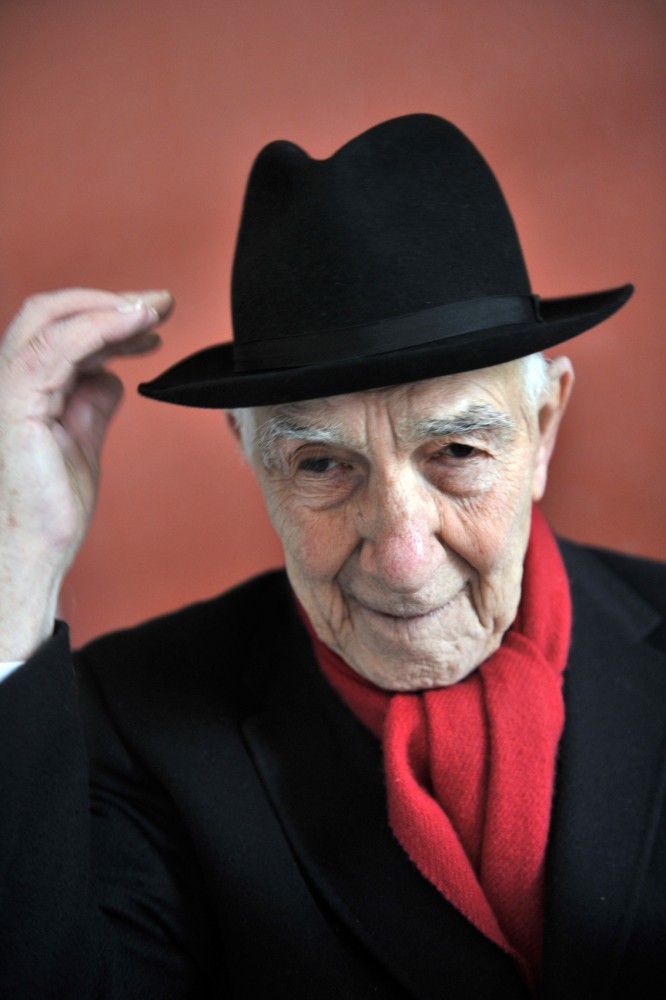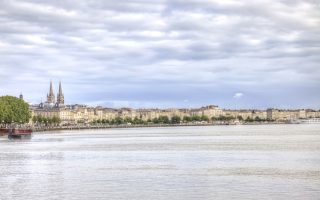Stéphane Hessel

Remember the famous scene from Sidney Lumet’s film Network, when the character Howard Beale shouts on TV, “I’m as mad as hell and I’m not going to take this anymore”? Stéphane Hessel might very well play the part, were there to be a remake. The elegant gentleman has become, at 93, France’s most notorious activist voice, since the sensational success of his short essay Indignez-Vous!, with more than 1.5 million copies sold so far. In the 29-page manifesto (roughly translated, Get Angry!), the former diplomat sums up his thoughts on today’s politics and recalls a life rich with experience battling oppression and defending human rights.
Born in Berlin on October 20, 1917, the author is the son of Franz Hessel, a Jewish writer, and Helen Grund, a painter and journalist. These two brilliant figures formed an enduring love triangle with Franz’s best friend, French journalist and writer Henri-Pierre Roché. Years later, Roché used their love story as a basis for his famous novel Jules et Jim—adapted for the screen in 1962 by François Truffaut, with Jeanne Moreau playing Stéphane’s mother.
After emigrating to France in 1925 with his family, young Stéphane often met famous artists in his home, including Marc Chagall, Pablo Picasso and Marcel Duchamp. “My family was extremely nonconformist, which really shaped the man I would become,” he says. Stéphane displayed a precocious intelligence, receiving his baccalauréat in philosophy at age 15 and winning admittance to the French Ecole Normale Supérieure in 1937. As he often explains in interviews, “I wanted to impress my mother!”
Hessel became a naturalized French citizen and was deeply immersed in French intellectual thought. Jean-Paul Sartre’s works on responsibility and commitment, especially, inspired his lifelong devotion to the causes he holds dear. He was mobilized by the French Army in 1939 and captured a year later, but escaped and joined De Gaulle in London in March 1941. Incorporated into the French Free Forces, he trained with the Royal Air Force as an observer but ended up being sent to France in 1944 to lead one of the underground Resistance networks. Captured again, on July 10, he was sentenced to death along with 36 others.
The group was transferred to Buchenwald, and 27 of them were quickly hanged. Stéphane Hessel was next up on death row. “I remember I was reciting poems to keep hope and survive,” he relates. And he did, miraculously saved: With the help of the camp doctor, he assumed the identity of Michel Boitel, a prisoner who was not slated for execution, but had already died of typhus, unbeknownst to camp authorities. As Boitel, he was then sent to other concentration camps, including Mittelbau-Dora, near Nordhausen in Germany, where he was once again sentenced to hang after a failed escape attempt. He finally succeeded in eluding his captors by jumping from a train, managing to join US troops in Hanover, and he returned to Paris on May 8, 1945, the very day of victory in Europe.
After the war, Hessel embarked on a successful career as a diplomat. In 1946, he worked at the UN Commission on Human Rights and participated in drafting the Universal Declaration of Human Rights. Close to Pierre Mendès-France, he held a succession of diplomatic positions and later represented France at the UN in Geneva. He founded the Association for Training in Africa and Madagascar, and throughout the years he fought for its principles and programs on behalf of the disadvantaged, even attacking President François Mitterrand for shady dealings with African dictators. Hessel was again in the spotlight in 1996, when he was appointed mediator for a group of desperate African immigrants facing deportation, who had taken shelter in the Saint Ambroise and Saint Bernard churches in Paris. By then he was 79, and shortly thereafter he was honored with the Grand Cross of the Order of Merit and made a Grand Officer of the Légion d’Honneur. Others might have retired from public life at that point. Not Hessel.
In 2004, along with other former résistants, he signed the petition “For a Treaty of a Social Europe”. Four years later, he denounced the French government for violation of human rights and noncompliance with Article 25 of the Universal Declaration of Human Rights, citing the government’s failure to provide housing for the homeless. In 2009, the former Socialist ran for office in the European elections, on the slate of the environmental party Europe Ecologie. But his latest achievement—at the age of 93—is probably his best known. With just 6,000 copies in its first press run, Indignez-Vous! captivated the nation, especially its youth. The numbers—1.5 million books snapped up in a matter of weeks—are too impressive to be explained solely by the book’s low price of €3, or about $5.
An idealist but not a utopian, Hessel has crossed paths with Nelson Mandela, the Dalai Lama and Yasser Arafat in the course of his life. Now he places his hope in Barack Obama, who, he says, “has explained his ideals through remarkable books, especially The Audacity of Hope”. Hessel is a huge fan of poetry, able to recite from memory hundreds of lines of Apollinaire and Shakespeare. He is also a man who knows his last breath is near, but he remains serene, stating in a recent documentary for the television channel France 5, “Poetry is the first step toward comprehension of life and death.”
An elder’s formula that young rebels can take to heart: Poetry, activism, outrage.
Works by Stéphane Hessel
Indignez-Vous! Editions Indigènes, 29 pages, (essay)
Danse avec le Siècle Grasset, 312 pages, (autobiography)
The 5 key precepts of Indignez-Vous!
Outrage breeds resistance: Everyone should have his own motives for outrage. For Hessel and his peers it was Nazism. The menace may not be as clear today as it was then, but there is injustice everywhere on the planet—including France’s treatment of illegal immigrants. It’s up to younger generations to take the lead now, and not fall into apathy. “When something outrages you, you become militant, tough, committed.”
The economy must change: “The gap between the very rich and the very poor has never been so wide,” says Hessel, reminding readers of the economic program of the National Council of Resistance. He calls for an immediate, wide-ranging debate on our economic system: “Political, economic, intellectual leaders and the rest of the population must not give up or become cowed by the current international dictatorship of financial markets, which threatens peace and democracy.”
Israel and Palestine must make peace: Born to a Jewish father, Hessel nonetheless deplores Israeli military actions against Palestine, especially Gaza. “The fact that Jews are themselves perpetrating war crimes is unbearable to me,” he says. “Alas, history gives too few examples of peoples learning from their own past.”
Nonviolence is the way: Terrorist acts may be understood at times, but they cannot be accepted. “Violence turns its back on hope. We should always go for hope, the hope that resides in nonviolence,” says Hessel, echoing Nelson Mandela and Martin Luther King, Jr.
A new civilization must arise: Although progress was made during the 20th century, the past decade has seen a step backward, with the 9/11 attacks, the war in Iraq and the financial crisis. There is need for “a peaceful insurrection against the mass media, which offer to the younger generation no future except consumerism, contempt for weaker people and for culture, general amnesia, and profligate competition of all against all.”
Originally published in the March 2011 issue of France Today
Share to: Facebook Twitter LinkedIn Email
Leave a reply
Your email address will not be published. Required fields are marked *



